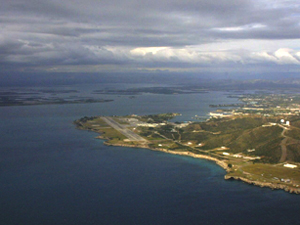Karolina Zydziak
Writer
Aerial view of Guantanamo Bay
Photo Courtesy of US Government
Members of the Human Rights Group gathered to peacefully protest the prolonging of the operation Guantanamo Bay Prison in Cuba and the recently passed National Defense Authorization Act on Feb. 1, arguing that it is a violation of human rights.
“The NDAA in whole is a long act, but there is a part of it that says that if you’re found to be suspicious of terrorist activity in any way you can be held indefinitely and without a trial, which basically goes against U.S. law, the Bill of Rights and international law in general,” said Denna Taherzadeh, a third-year global studies major and chair of the Human Rights Group.
As a United States Armed Forces-run prison, Guantanamo is not operated like the typical prison.
“Not everyone there is tortured. Not everyone there is treated inhumanely, but we still need to be aware and recognize that there are detainees being tortured for information,” said Mayur Prajapati, a second-year biological sciences and secretary of the Human Rights Group.
According to the Human Rights Group, the NDAA can treat those in American prison systems in a way similar to how prisoners are treated in Guantanamo Bay Prison.
“The clause [of the NDAA] is pretty much up to the president at the time so the thing that is scary with the NDAA is that it gets so much more presidential power and it’s going against the Constitution,” said Kendra Burns-Edel a fourth-year political science and sociology major and vice president of the Human Rights Group.
As President Barack Obama took office, he claimed to make closing Guantanamo Bay one of his first orders of business.
“Nothing has changed and Obama has not closed Guantanamo, even though he said he was going to,” said Burns-Edel.
“[Obama] kept signing provisions and executive orders saying that Guantanamo Bay needs to remain opened because there are certain prisoners there that can’t be removed or there are certain liabilities that exist,” said Prajapati. “So four years later we are still here, we still have Guantanamo Bay.”
According to the Human Rights Group, this extension of the prison operation and passing of NDAA has been kept hidden from the public because it was not discussed very much and seemed to be signed without much of the public’s knowledge.
“It’s crucial for UCSB students to know about the human rights abuses because it’s a huge domestic issue and it’s happening right under people’s noses,” said Taherzadeh.
The organization’s effort to raise awareness and educate the student body via protest is only the beginning, and they hope to continue such efforts in order to bring the issue back to the public’s attention.
“We just want to let people know that this is still an issue and it hasn’t gone away,” said Burns-Edel.











